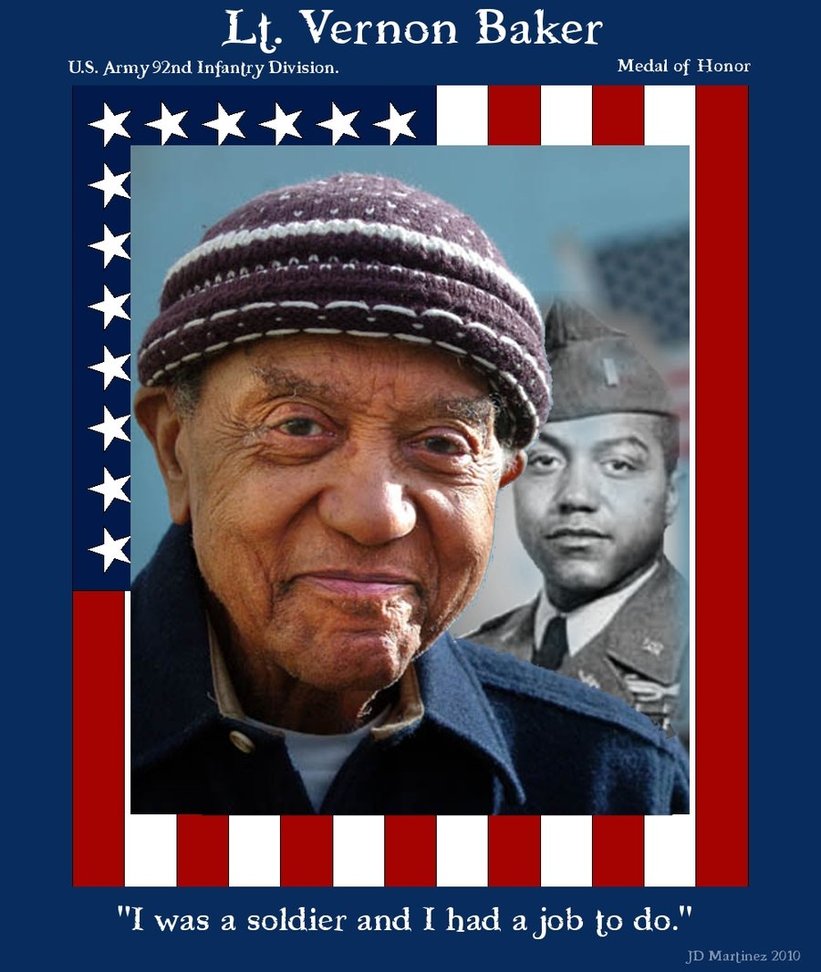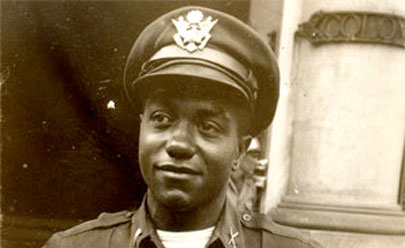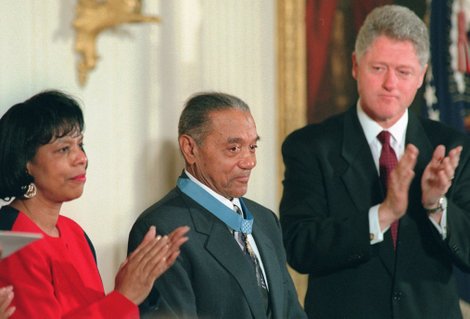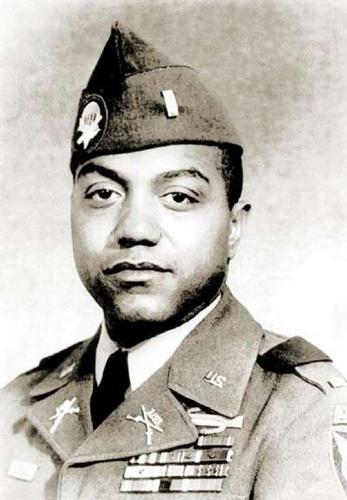
TGIF POU!
Today’s feature is pretty long, but is a fascinating well-worth-it read!
Vernon Joseph Baker
Vernon Joseph Baker belatedly received the Medal of Honor for his World War II battlefield valor after historians concluded he’d been wrongly denied the military’s top award because of his race. He was awarded the honor by President Bill Clinton in 1997.
Baker was born on December 17, 1919, in Cheyenne, Wyoming, the youngest of three children. After his parents died in a car accident when he was four, he and his two sisters were raised by their grandparents. His grandfather Joseph S. Baker, a railroad worker in Cheyenne, taught him to hunt in order to feed the family and became “the most influential figure in Vernon’s life.” His relationship with his grandmother was much more strained, and he spent a few years at the Boys Town orphanage in Nebraska to be away from her.
Baker graduated from high school in his grandfather’s hometown of Clarinda, Iowa. He then worked as a railroad porter, a job he despised, until his grandfather’s death from cancer in 1939. A series of menial jobs followed until his enlistment in the United States Army in mid-1941. At his first attempt to enlist, in April 1941, he was turned away, the recruiter stating “We don’t have any quotas for you people.” He tried again weeks later with a different recruiter and was accepted; he requested to become a quartermaster but was instead assigned to the infantry.
Baker entered the Army on June 26, 1941, six months prior to the U.S. entry into World War II. He went through training at Camp Wolters, Texas, and after completing Officer Candidate School was commissioned as a second lieutenant on January 11, 1943. In 1944, Second Lieutenant Baker was sent to Italy with a full platoon of 54 men.
The following is taken from Badass of the Week:
It was a cold, rainy April afternoon in 1945 when Lieutenant Vernon J. Baker of the 92nd Infantry Division led his small, 25-man weapons platoon high through the smoke and crater-swept mountainside leading to the ominous German-controlled fortress known as Castle Aghinolfi – a foreboding old-school Dracula-style castle that was kind of like Castle Wolfenstein, only real and sort-of Italian. A heavily-fortified enemy stronghold high in the Appenine Mountains of Italy, this intimidating medieval Castle overlooked one of the few major roads that led through the ferociously-defended Gothic Line – an almost impenetrable wall of machine guns and artillery that blocked the Allies from charging straight up through Italy into the soft, delicious, peanut-butter-stuffed underbelly of the German Reich. If this position were to fall, it would spell the end of German power in Italy forever.
Lieutenant Baker and his team carefully picked their way through the barbed wire and minefields that lay between themselves and the sniper-filled Mountain Fortress of Doom. Baker had already been badly wounded during a battle a few months earlier, and after seeing the rest of his Division get mowed down attempting full-frontal assaults on the this stone-walled Nazi Death Lair, he resolved to be a little more careful on his approach. It worked – using his badass stealth skills, staying low and picking his way through well-defended arias, Baker led his men deep through enemy territory, past patrols, and somehow emerged through the fortified front lines, climbing up the mountain to a position a mere 250 yards from the castle. Along the way, he found a concrete German observation post (he stuffed his rifle in the viewport and emptied the clip, smoking both Germans inside), and also stumbled into a camouflaged Italian machine gun nest (the crew were eating breakfast and he waxed them faster than they could cough up their disgusting sauerkraut and Nutella-slathered omelets). Neither presented Baker with much of a problem.
The Aghinolfi castle of Montignoso
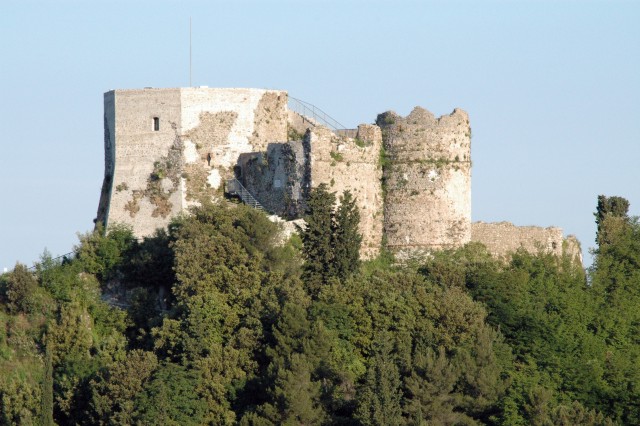
After getting his team in position, Baker ran back and linked up with his commanding officer, a total flaming douchebag Captain named Runyon who only got this far behind enemy lines by simply following along behind Baker. Runyon started issuing orders to advance on the castle when suddenly a German potato-masher grenade came flying in out of nowhere and clanked right off Runyon’s helmet. Runyon ran for it and/or crapped himself (probably while crying) while Baker smoked the dude who threw the grenade, then calmly told his C.O. that the grenade was a dud. On his way back to his team, Baker stopped for a second to blow up a German bunker with a few well-placed grenades of his own (these ones didn’t have any trouble blowing up), and cut a telephone wire that connected front-line weapons teams with the headquarters unit back in the castle.
With the Castle looming ominously in the distance Dark Tower-style, Baker ordered his team to move up into the olive groves at the base of the castle itself. His team moved up, careful to watch for ambush, but once they reached the orchard all of a sudden all goddamned hell broke loose – all at once a Chuck-E-Cheese animatronic jug band nightmare of machine guns, snipers, and mortars rained down on him from concealed positions in the fortress and on the mountain, and suddenly Lt. Baker found himself in the middle of an insane-as-hell killzone.
Well despite being surrounded on all sides by dudes trying to kill him, totally cut off from his own lines, and with his tiny squad taking casualties from every direction, Vernon Baker still wasn’t about to go down without a fight. This was a guy who’d dealt with all the bullshit life had to throw at him and still always emerged on top – when his parents died in a car accident when he was four years old, he survived by working tough jobs like railroad porter and shoeshiner. When his family needed food, he went hunting in the woods with his grandfather Vasily Zaitsev-style, shooting everything from elk to cougars.
This wasn’t a guy who was just going to give up and die.
First, Lieutenant Baker did the sane thing and radioed in for help, calling down artillery to the coordinates of the German and Italian weapons teams. His request was denied. Apparently, the dude on the other line couldn’t possibly fucking fathom the idea that Baker had reached the Nazi Castle Death Mountain by himself, especially considering that any Allied soldier who stood within ten miles of the damn thing spontaneously combusted. So, he raced over to Captain Runyon and asked him for orders. Runyon told Baker he’d bravely run the hell out of there, and that he’d send reinforcements when he got back to American lines. He lied. When Captain Runyon returned to his command post, he reported Baker’s platoon had been annihilated. Awesome.
Left for dead, Baker fought on, battling the Germans for hours, deep behind enemy lines, totally oblivious to the fact that he had absolutely no hope of reinforcements or relief. Finally, after several hours of constant firing against an impossibly-gigantor, heavily-equipped enemy force, almost completely out of ammo and with 19 of his 25-man team lying dead, Baker ordered a withdrawl.
Naturally, in order to make sure his six surviving men got out of there alive, Baker stood up in full view of the enemy, screamed like a maniac, and sprayed a hail of bullets in every direction. The Germans concentrated their fire on him, letting Baker’s men slip out safely.
Baker was shot a couple times during his epic diversion, but he somehow managed to achieve the Steven Segal Singularity (complete immunity to all bullets, i.e. the “IDDQD God Mode Rule”) and get out of there with his life. All told, he had single-handedly killed at least nine Nazis, and destroyed six machine guns nests, two observation posts, and cleared four enemy dugouts. When he reached HQ safely, after everyone had already written him off for dead, dudes were all like, “WTF how the shitballs did this happen?” They nominated him to lead another attack the following night – despite having two bullet wounds in him, Baker complied, leading a full-strength battalion of white soldiers on a night attack through the enemy minefield and right up to the front doors of the castle. The position fell the next day. It was one of the first times in American history that a black soldier was placed in command over white troops (even though it was technically “unofficial”)
For his ultra-badass deeds getting Medieval on a fucking German castle, Vernon J. Baker would receive the Distinguished Service Cross – the second-highest award for bravery offered by the United States government. He’d finish out the war, spending the later days with the army of occupation in Rome and by the time he was done, he also had a Polish War Cross, a Bronze Star, and the Croci de Guerra, the Italian version of the Medal of Honor. Baker would serve with the Army until 1968 (airborne no less, jumping out of planes until he was 48 years old).
With the aid of one of his men, Baker attacked two more machine gun nests, killing or wounding the four enemy soldiers occupying these positions. Then he covered the evacuation of his wounded soldiers by occupying an exposed position and drawing the enemy’s fire.
In all, Baker and his platoon killed 26 Germans and destroyed six machine gun nests, two observer posts and four dugouts.
He said later he felt the company commander, who said he was going to get reinforcements, had abandoned his group of men.
“It made me all the more determined to accomplish our mission,” he told the PBS series American Valor. “Because at that time the Army was segregated. It was thought that we were unable to fight.”
No black soldiers were awarded the Medal of Honor during World War II, although Baker did receive the Purple Heart, a Bronze Star and Distinguished Service Cross.
In 1993, U.S. Army officials contracted Shaw University in Raleigh, North Carolina, to study whether there was a racial disparity in the way Medal of Honor recipients were selected.
Historians did not find official evidence suggesting racial bias in the Army’s award policy. But the study’s authors say the political climate and common Army practices guaranteed no black soldier would ever receive the military’s top award.
The university researchers recommended 10 soldiers to receive it. From that list, Pentagon officials picked seven.
But there was one problem — the statutory limit for presentation had expired. Congress was required to pass legislation that allowed the president to award the Medals of Honor so many years after the action.
Vernon Baker was the only recipient still living; the other six soldiers received their awards posthumously, with their medals being presented to family members.
Baker was initially rebuffed when he tried to join the Army. Baker said in an interview with public television that a recruiter told him there was no quota for enlisting “you people.”
Reflecting on life in a segregated Army unit, he told The Washington Post, “I was an angry young man. We were all angry. But we had a job to do, and we did it.” He added that he “knew things would get better, and I’m glad to say that I’m here to see it.”
Baker returned to his northern Idaho home after the war. When he received a call telling him he was to receive a Medal of Honor, at first he was astonished. Then he was angry.
“It was something that I felt should have been done a long time ago,” he told Idaho public television. “If I was worthy of receiving the Medal of Honor in 1945, I should have received it then.”
Baker called his 1997 memoir Lasting Valor.
U.S. Rep. Walt Minnick said he met Vernon Baker in the 1990s when the soldier spoke at a College of Idaho event. Minnick said he’d been expecting a battle-hardened soldier but was instead struck by Baker’s gentle demeanor. Minnick said Baker’s valor on the battlefield in Italy was a rebuke of racist policies that dominated the U.S. military into the middle of the last century.
“His actions on the front line demonstrates better than words can describe why discrimination and segregation in the military was both unfair and absolutely inconsistent with an effective fighting force,” Minnick said. “He demonstrated a degree of courage few people have. He was prepared to give his life for his country — a country in which he was considered a second-class citizen.”
Baker died at his St. Maries, Idaho, home on July 13, 2010 after a long battle with cancer.

